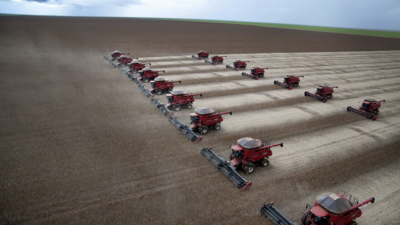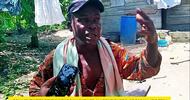 Soybeans from Brazil have been connected in some instances with deforestation and land grabbing (Photo: Paulo Fridman/Bloomberg)SustainableViews | 30 October 2024
Soybeans from Brazil have been connected in some instances with deforestation and land grabbing (Photo: Paulo Fridman/Bloomberg)SustainableViews | 30 October 2024Investigation links German meat companies to possible land grabbing and deforestation
By Florence Jones
A group of non-profits has called on Germany’s trade agency, the Federal Office for Economic Affairs and Export Control, to investigate three German meat companies after discovering possible links between their soya supply chains and damaging environmental and social practices in Brazil.
The submission by non-profits ClientEarth, Environmental Action Germany and Mighty Earth follows an investigation by the latter two non-profits which suggests there is a “high risk” that soya supplied to the meat producers has links to land grabbing — land deals that happen without the free, prior and informed consent of the land’s inhabitants — deforestation and large-scale pesticide use, which can contaminate local water supplies.
They tracked the soya from where it was grown in Brazil’s Cerrado savannah, via the Netherlands, to soya terminals in Germany. From there it was distributed to the country’s biggest animal feed facilities, farm suppliers and slaughterhouses to feed livestock, the group says.
Pork producers Tönnies and Westfleisch and poultry producer Rothkötter, three of the country’s largest meat producers, have “likely connections” to US-headquartered soya producer Bunge, the non-profits say. This is based on the movement of soya shipments, which imply a probable supply chain connection between Bunge and the three companies.
“Several studies point to the high risk of human rights violations and environmental destruction associated with Bunge’s supply chains,” the non-profits say in a report.
Bunge accounts for about a quarter of all imports of Brazilian soya from the Cerrado to Germany, they add.
A 2023 study, by non-profits Mighty Earth and Environmental Action Germany and cited in the report “directly links” Bunge to the deforestation of roughly 15,900 football fields in the Cerrado.
“Land conflicts, land grabbing and the violation of the territorial rights of traditional peoples and communities” have been documented in the Cerrado, the non-profits say. Planting monocultures also attracts pests, often driving pesticide use and resulting in its run-off into local waterways, the report adds.
In breach of due diligence law
In addition, the non-profits have raised questions about whether the companies may be in “breach of Germany’s new Supply Chain Due Diligence Act” by failing to conduct necessary due diligence on their supply chains.
The act, which has applied to companies with more than 3,000 employees since the beginning of 2023 and to companies with more than 1,000 employees from the beginning of 2024, requires businesses to identify, assess and prioritise environmental and human rights risks in their supply chains.
This includes indirect suppliers with which a company has an ad hoc relationship, if the company has “indications” that human rights abuses “appear possible”, the non-profits add in a statement accompanying the report.
Companies must publish a policy statement on these risks and take “measures” to prevent or minimise damage to human rights and the environment under the law.
According to the statement, neither Tönnies nor Westfleisch cite risks in areas such as deforestation, land rights or health risks from pesticides in relation to their soya supply chains in their human rights declarations, required by the new act. It adds that “ClientEarth believes this indicates non-compliance with basic formal requirements of the law”.
The statement says Rothkötter “mentions some relevant risks but predominantly contains broad-spectrum statements and vague commitments”.
The report has been published a week after Mighty Earth revealed links between UK chicken producer Moy Park and US soya producer Cargill. The non-profit alleges the latter has also been linked to deforestation in the Cerrado.
Farm-level traceability
Previously, German meat producers have often relied on “sustainability certificates”, sourced through a third party, to minimise the environmental and human rights risks in their supply chains, the report suggests.
However, the country’s due diligence law and the EU’s Deforestation Regulation do not permit the use of certificates to meet sustainability requirements and companies must perform their own due diligence checks, the non-profits say.
The EUDR will apply to every large company that places cattle, cocoa, coffee, palm oil, soya and wood on the EU market or exports the commodities from December 31 2025, if a proposal by the European Commission to delay the regulation by one year is granted by parliament.
Under the rules, companies must perform the appropriate due diligence to ensure products are not grown or raised on deforested land. This will include ensuring they can trace the soya they are sourcing down to the farm it originated from, the report suggests.
Relying on sustainability certificates means that soya certified as sustainable can be mixed with soya that originates from areas linked to land grabbing and environmental destruction, the non-profits allege.
A Tönnies spokesperson tells Sustainable Views that the company “cannot see breach of the due diligence law” and has “implemented all requirements” of the due diligence act that it deems relevant, including “risk analysis” and working with suppliers.
The other companies featured in the report did not respond to requests for comment.













